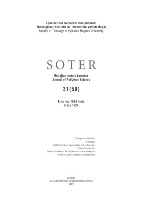Sofiologinė Švč. Trejybės asmenų samprata Elisabeth A. Johnson feministinėje teologijoje
THE SOPHIOLOGICAL UNDERSTANDING OF THE HOLY TRINITY PERSONS IN THE FEMINIST THEOLOGY OF ELISABETH A. JOHNSON
Author(s): Valdas MackelaSubject(s): Christian Theology and Religion
Published by: Vytauto Didžiojo Universitetas
Keywords: feministinė teologija; kalba apie Dievą; Trejybė; sofologija; feminist theology; God Language; Trinity; sophiology
Summary/Abstract: The discussion about femininity in God, or even the question of God’s femininity has recently come as a reaction of feminist theology to the domination of men and masculine theology in Christianity. In many languages God, Father, Son and Holy Spirit are the words of masculine gender and a feminine gender for “Spirit” in Hebrew and Lithuanian are rare exceptions. The question, which was considered as merely arbitrary, nowadays is held in all seriousness. Isn’t it just a philological question which has nothing in common with the theological consideration about the nature of God. Christian feminist theology, in this article represented by an American theologian Elisabeth A. Johnson, maintains that we do not have to understand the language about God literary. Our language is essentially connected with this world human experience and always influenced by the cultural environment. Therefore, the language about God in theology should be used in a very careful hermeneutical way. Moderate Christian feminist theologians, such as Elisabeth A. Johnson, contrary to the radical feminist authors imply that feminine images of God do not deny masculine images. Elisabeth A. Johnson in her fundamental study “She Who Is” and numerous articles focuses both on the question of the language and the exaggerated masculinity of theology in the past, but presents reconsidered interpretation of biblical texts as well. One of the essential texts in the Hebrew Bible is the text about revelation of God’s name in a burning bush to Moses. Elisabeth A. Johnson insists, that this name originally found in verbal form says nothing about gender of the speaker. Therefore, we may speak about God not only as “He Who Is”, but also about God as “She Who Is”. This change has its further implications, because such God not just wholly transcendent and unknowable as in traditional “masculine” theology, but on the contrary – wholly immanent, caring for its people, God is not a philosophical abstraction. God, first and foremost is a relation. Elisabeth A. Johnson provides numerous texts from the Old Testament, where the Bible uses feminine language and imagery about God. Especially this is evident in a prophetic literature. God might appear to be more sensitive and caring as mother for her son: “Can a woman forget her nursing child, and have no compassion on the son of her womb? Even these may forget, but I will not forget you” (Is 49:15). The language of the Bible is always very concrete: the word mercy, tenderness - rahamim – literary “entrails”– is a plural form from rehem (raham) - “a womb”. According to Elisabeth A. Johnson in the Bible there are several specific feminine metaphors: Shechina as active presence of God with people in the Holy of Holies in the Temple; Wisdom as personification of a creating and supporting power of God in Proverbs and other Wisdom literature. In a similar way Elisabeth A. Johnson speaks about the second person of Holy Trinity. One of key texts, that allow h
Journal: SOTER: religijos mokslo žurnalas
- Issue Year: 59/2009
- Issue No: 31
- Page Range: 53-72
- Page Count: 20
- Language: Lithuanian

